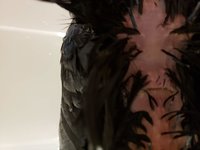Here's a little history first. I'm in Naples, FL. I don't know what type of hen this is. Previous caretakers said she had appeared to be egg bound. This was probably two months ago or more. They took her to the vet and no egg was found or any sign of her being egg bound but they gave her an antibiotic shot. She got better. That's when we acquired her along with 6 other hens. This was several weeks ago and all has been great until 2 days ago she started walking with her butt and tail feathers lowered to the ground. She walks a little slower and she seems to be sitting/dust bathing more than what is usual. She isn't exactly lethargic though. She is roaming the yard and grazing with the flock, just slower. She was also drinking when I turned the hose on. She seemed a little warm when I picked her up. I tried to feel for a lump and her back end is just squishy like a water balloon, not sure if it's normal. I tried to feel in her vent for an egg and I don't feel anything. There seemed to be a little clear/whitish mucus below the vent though but not in it. I originally thought it was just cast off from a nasty dropping. I don't know. Anyway, I am being long winded sorry. I soaked her in a warm bath for a bit, now she is dry, and hanging out in the bathroom on some towels. She is very docile and friendly anyway. I took a couple photos and quick video of her vent after the bath but I can't seem to load the video. I have no idea if it's normal. I've never had to look at one before. It's not red or inflamed. It does have some yellowing of the skin around the vent, just inside really. But I don't mean like mucus or pus. When I lift her tail feather, she sucks her vent in/out...is that normal?
Any help as to what you think is going on would be greatly appreciated.
I've had chickens for a few years now and except for wildlife attacks and one round of fowl pox, we have never had a sick hen.
Any help as to what you think is going on would be greatly appreciated.
I've had chickens for a few years now and except for wildlife attacks and one round of fowl pox, we have never had a sick hen.









 so no worries on mating her. She has never laid an egg since we have had her...3-4 weeks. I've asked my husband to contact the previous caretakers and find out when this last issue occurred and if they know the last time she laid. I put her to bed with the 2 bantams that came with her, mainly because it is a smaller coop and she won't fall. I'm trying to think of anything to tell but not sure.
so no worries on mating her. She has never laid an egg since we have had her...3-4 weeks. I've asked my husband to contact the previous caretakers and find out when this last issue occurred and if they know the last time she laid. I put her to bed with the 2 bantams that came with her, mainly because it is a smaller coop and she won't fall. I'm trying to think of anything to tell but not sure.